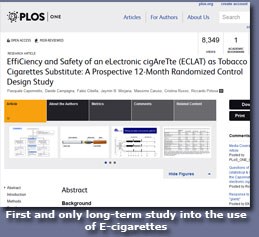 |
 |
|
Chris Ingram, Unionsafety Website Editor reports: Once again the smoke screens over possible health issues regarding nicotine and smoking are being erected as the new E-Cigarette industry starts to flex its muscles, campaigning against regulation, claiming jobs are threatened and that there are no safety issues around E-Cigarettes.
The E-cigarette lobby is also claiming thousands of users are quitting smoking as a result of their product – facts that cannot in anyway be borne out. In fact, there is evidence that people who never smoked before are taking up E-cigarettes and therefore becoming addicted to one of the most addictive chemicals, nicotine. Further, as with alco-pops, the manufacturers of E-cigarettes are making fruit and sweat flavoured products which are targeted at young people. As if to bear this out, the BBC reported in February this year that a woman now using e-cigarettes told them the e-cigarette has helped her to stop smoking. "I've tried patches and inhalators," she says. "They're a lot better because you feel like you're having a cigarette." With another woman saying: "They're a great idea. You've got the health benefits from it and it does taste like a cigarette." From YouTube this comment following a video extolling the virtues of e-ciggs from one of the 'next generation nicotine vapourers' as opposed to smokers: "Just quit smoking ciggs and started vaping June 1st so in just 4 days I find there is so much to learn so it's still over my head a bit will have to watch this a few times to make sense of it all feeling so lost but enjoying vaping." Currently being available anywhere with no age restrictions on whom they can be sold to, any opportunity to regulate them as a medicine and restrict the age of exposure to nicotine; will not be available until 2016 the earliest.
Whilst the health and safety issues around the contents of E-cigarettes are only just being discussed by our government, countries such as Australia and Austria have already done so and banned their use and sale. However, in Holland and Germany, manufacturers of the nicotine delivery system that is an e-cigarette, successfully overturned in the courts; their government's previous assigning the product as a medical device. In the UK, the government is following the USA and has pronounced that they intend to enforce regulation upon the E-cigarette industry through licensing and applying the same restrictions as for that of normal cigarettes. American Cancer Society says that there is a lack of evidence to show its health benefits or indeed the safety of using them, with the US Food and Drug Administration (FDA) banning them from being imported into the country. The FDA have gone further as reported previously by Unionsafety and issued a report that claims they are unsafe due to the presence of chemicals used to make anti-freeze!
These statements sadly, were not challenged by the programme, although they did include comments from those agreeing with the government’s statement that they will need to be licensed as a medical product and limited to the sale of over 16 yr olds as is the case now with normal cigarettes. A simple check via Google brings up the fact that the majority of comments and videos applauding E-cigarettes are from smokers who say how they’ve cut down on tobacco products and use either both the E-cigarette and fewer normal cigarettes, or have transferred over to the E-cigarette totally. But, finding those who claim to have stopped both seems to be a problem. In fact it has now become a ‘hobbyist’ activity with its own slang and is now known as ‘vaping’ as opposed to ‘smoking’. An example can be watched here This shows that E-cigarettes are far from the ‘quit smoking’ aid that was claimed on the BBC North West Tonight programme, but is a whole new 'hobby' flourishing around the world. The programme did challenge the fact that given the varying flavours now being rolled out and widely advertised, that children and non-smokers are trying them out and given the efficacy of nicotine in terms of its addictive nature; the industry may well be creating a whole generation of people addicted to the E-cigarettes. It can of course be argued that because manufacturers are against regulation and producing flavoured E-cigarettes, they are knowingly creating a guaranteed future consumption of their product in the next and future generations. As there was with bans on the use of tobacco cigarettes in pubs and all enclosed spaces, so too there is a major outcry about any regulation of this new smoking phenomenon, with manufacturers and users setting up campaign groups opposing any regulation at all! In fact the manufacturers are taking out newspaper ads and on-line ads posed as news items but which are simply advertisements.
The sorry history of alco-pops and the tobacco industry provides lessons that people clearly have not learned. I have raised my objections direct with the makers of the programme, BBC TV and await a response. In the USA there are many physicians who are calling for a ban on the E-cigarette altogether, or at least tough regulation. Watch here Many commentators now argue that the vapour in the product produces harmful chemicals and have never been tested and doubt the efficacy of the product in helping people quit smoking. In fact, they argue, people are simply swapping one addiction for another. Indeed, one GP proponent of supplying them to smokers as aid to quit smoking admits that the exhaled mist conatins 1% nicotine; which means second-hand 'vapour' from the product can be inhaled by those nearest to the user of such products. However, there is another argument of course that says because there is no tar and none of the 400 other harmful chemicals within normal cigarettes; there may well be long-term public health benefits from people switching to electronic cigarettes. Professor John Britton, who leads the tobacco advisory group for the Royal College of Physicians was quoted in February this year by the BBC as saying: However, the toxicology of nicotine itself points to it being a totally harmful substance, whilst not being delivered in the amount required to cause harm in conventional cigarettes. E-Liquid, (liquified nicotine) used in the delivery system of E-cigarettes, is another thing altogether and has the potential to cause nicotine overdose, which can lead to death. But the key ingredient in the electronic cigarette, apart from nicotine, is Propylene Glycol which is used to hold the liquid nicotine which is then heated up to produce the smoke that smokers are used to and without which the developers of e-cigarettes think would result in a far lower uptake of smokers transferring to the electronic from the conventional and far more hazardous tobacco cigarette. The US Food and Drugs Administration (FDA) has implemented a ban on imports of e-cigarettes in the USA and issued a warning of potential health problems, as a result of their tests on 19 different brands of e-cigarette showing the presence of carcinogens; cancer causing compounds called nitrosamines. They also contain levels of diethylene glycol, used in anti-freeze said the FDA.
As expected, and as with normal cigarettes, the industry is fighting back. It claims that the FDA's ban is sending out the wrong message. "It is likely to force e-cig users back to using conventional cigarettes, with their well known serious health problems. That could be more dangerous to health than anything indicated by testing electronic cigarettes so far.", says Electronic Cigarette Direct on their website and quoting the American Association of Public Health Physicians as the source. REMEMBER: Cigarette manufacturers denied any health risks associated with toxic chemicals contained in cigarette smoke for over 25 years! Could the toxic chemicals we are exposed to on an everyday basis be the next "tobacco scandal"?
Whilst the US FDA and the World Health Organisation have both issued bans on E-Cigarettes because of the fact that they contain levels of carcinogens and that there is no proof they help people cut down or stop smoking altogether; the UK's Action on Smoking and Health (ASH) have issued a report this month, stating their support for the use of
e-cigarettes because "There is little real-world evidence of harm from e-cigarettes to date, especially in comparison to
smoking." Their 8 page report also says,
"Any health risks of secondhand exposure to propylene glycol vapour are likely to be limited to irritation of the throat. One study exposed animals to propylene glycol for 12 to 18 months at doses 50 to 700 times the level the animal could absorb through inhalation. Compared to animals living in normal room atmosphere, no localised or generalised irritation was found and kidney, liver, spleen and bone marrow were all found to be normal." But there is no mention of the levels of nicotine in the vapour given off. One question of course is that given e-cigarettes contains propylene glycol, in the context of the workplace, surely the electronic cigarette, the vapour of which given off contains propylene glycol, and not mere water vapour as is claimed to be the case by the manufacturers; would place its use in the workplace within the CoSHH regulations? Clearly the view expressed by Hugh Robertson of the TUC as reported by this website here that E-cigarettes have no place in the working environment, is one that all those concerned with health and safety in the workplace, and in their homes and enclosed public areas; believe should prevail until complete and independent testing of electronic cigarettes has taken place and the findings subjected to peer review. The study conclusion is that "in smokers not intending to quit, the use of e-cigarettes, with or without nicotine, decreased cigarette consumption and elicited enduring tobacco abstinence without causing significant side effects." The study supports the view of ASH as detailed above.
Interestingly, the study report authors support regulation: "Obviously, these products need to be adequately regulated. Thus far, there have been heterogeneous regulatory responses ranging from no regulation to complete bans." They explain the background to the study: "Nicotine: An extract of tobacco, nicotine can be used as a poison contact spray for sucking insects such as aphids. In the concentrated form in which it is sold, it is highly dangerous to human beings; even physical contact is dangerous. Nicotine in a sulfate solution is sometimes used to control serious insect infestations." You can also download the Italian university study into E-cigarettes from the E-Library Database by using search word 'ECLAT' here Source: TUC / Daily Telegraph / Unionsafety / Health-Report UK / U.S. Department Of Health And Human Services / Electronic Cigarette Direct / ASH / US Food and Drugs Administration / BBC TV / YouTube / Plusone / Organic Gardening Encyclopedia / Inchem / Julia Higa de Landoni |
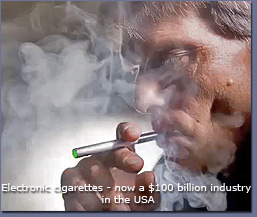 They are also using emotional blackmail by saying any attempts to regulate the industry will stop millions of smokers from taking them up and no longer being exposed to the 4000 harmful and carcinogenic chemicals in normal cigarettes.
They are also using emotional blackmail by saying any attempts to regulate the industry will stop millions of smokers from taking them up and no longer being exposed to the 4000 harmful and carcinogenic chemicals in normal cigarettes.  By then it is feared that hundreds of thousands of young people and adults who have never smoked before will have tried E-cigarettes and will be addicted to nicotine as a result. Furthermore, as there is no regulation of them, the level of nicotine delivery varies from one type of e-cigarette to another; and no way of stopping dangerous inferior models being imported and put on sale in the UK.
By then it is feared that hundreds of thousands of young people and adults who have never smoked before will have tried E-cigarettes and will be addicted to nicotine as a result. Furthermore, as there is no regulation of them, the level of nicotine delivery varies from one type of e-cigarette to another; and no way of stopping dangerous inferior models being imported and put on sale in the UK. 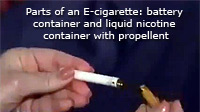 Here last Friday 21st June, the issue was discussed on BBC’s North West Tonight programme, but with interviewees falsely claiming that people have used them successfully to give up smoking altogether; and that they are a good tool to use instead of normal cigarettes in order to cut down and eventually stop smoking.
Here last Friday 21st June, the issue was discussed on BBC’s North West Tonight programme, but with interviewees falsely claiming that people have used them successfully to give up smoking altogether; and that they are a good tool to use instead of normal cigarettes in order to cut down and eventually stop smoking. 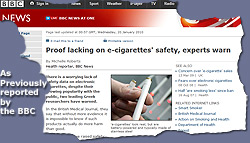
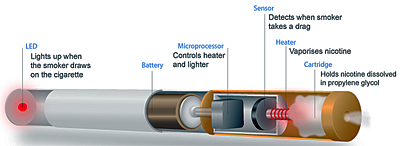 The use of cheaper grade Propylene Glycol may be the source of this, but nevertheless no one is denying that these chemicals which are found in anti-freeze, are also found in electronic cigarettes.
The use of cheaper grade Propylene Glycol may be the source of this, but nevertheless no one is denying that these chemicals which are found in anti-freeze, are also found in electronic cigarettes. 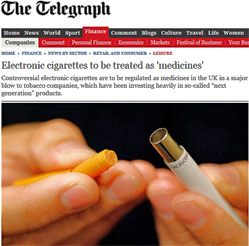
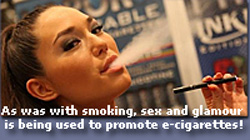 But the issue of GPs prescribing them for those who only wish to cut down is perhaps one of the most controversial aspects of the Government’s stance.
But the issue of GPs prescribing them for those who only wish to cut down is perhaps one of the most controversial aspects of the Government’s stance.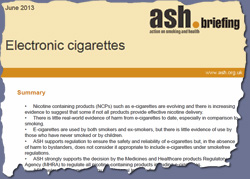 On the question of exposures to propylene glycol, the ASH report says there is little to worry about:
On the question of exposures to propylene glycol, the ASH report says there is little to worry about: